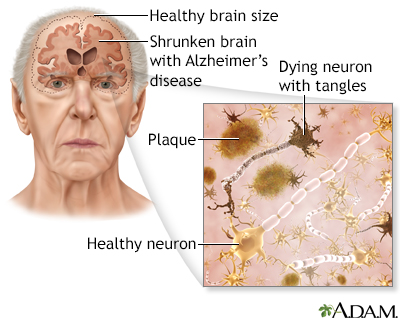Dementia - behavior and sleep problems
Sundowning - care
Images

I Would Like to Learn About:
Description
People with dementia often have certain problems when it gets dark at the end of the day and into the night. This problem is called sundowning. The problems that get worse may include:
- Increased confusion
- Anxiety and agitation
- Not being able to get to sleep and stay asleep
Tips for Behavior and Sleep Problems
Having a daily routine may help. Calmly reassuring and giving cues to orient the person who has dementia is also helpful in the evening and closer to bedtime. Try to keep the person going to bed at the same time every night.
Calm activities at the end of the day and before bedtime may help the person with dementia sleep better at night. If they are active during the day, these calm activities can make them tired and better able to sleep.
Avoid loud noises and activity in the home at night, so the person does not wake up once they are asleep.
Do not restrain a person with dementia when they are in bed. If you are using a hospital bed that has guard rails in the home, putting the rails up may help keep the person from wandering at night.
Always talk with the person's health care provider before giving them store-bought sleep medicines. Many sleep aids can make confusion worse.
If the person with dementia has hallucinations (sees or hears things that are not there):
- Try to decrease the stimulation around them. Help them avoid things with bright colors or bold patterns.
- Maintain enough light in the bedroom so the person can see and knows where they are if they awaken in the night. But try to keep the bedroom dark enough to promote sleep.
- Help them avoid movies or television shows that are violent or action-packed.
Take the person to places where they can move around and exercise during the day, such as shopping malls.
If the person who has dementia has an angry outburst, try not to touch or restrain them -- only do so if you need to for safety. If possible, try to stay calm and distract the person during outbursts. Do not take their behavior personally. Call 911 or the local emergency number if you or the person with dementia is in danger.
Try to prevent them from getting hurt if they start wandering.
Also, try to keep the person's home stress-free.
- Keep lighting low, but not so low that there are shadows.
- Take down mirrors or cover them.
- Do not use bare light bulbs.
When to Call the Doctor
Contact the person's provider if:
- You think medicines may be the cause of changes in the behavior of the person who has dementia.
- You think the person may not be safe at home.
Related Information
Brain aneurysm repairStroke
Dementia
Alzheimer disease
Communicating with someone with aphasia
Dementia and driving
Dementia - daily care
Dementia - keeping safe in the home
Dry mouth during cancer treatment
Communicating with someone with dysarthria
Swallowing problems
Stroke - discharge
Dementia - what to ask your doctor
References
Budson AE, Solomon PR. Evaluating the behavioral and psychological symptoms of dementia. In: Budson AE, Solomon PR, eds. Memory Loss, Alzheimer's Disease, and Dementia. 3rd ed. Philadelphia, PA: Elsevier; 2022:chap 24.
National Institute on Aging website. Managing personality and behavior changes in Alzheimer's. www.nia.nih.gov/health/alzheimers-changes-behavior-and-communication/managing-personality-and-behavior-changes. Updated May 17, 2017. Accessed June 11, 2024.
National Institute on Aging website. 6 tips for managing sleep problems in Alzheimer's. www.nia.nih.gov/health/sleep/6-tips-managing-sleep-problems-alzheimers. Updated May 17, 2017. Accessed June 11, 2024.
BACK TO TOPReview Date: 5/20/2024
Reviewed By: Jacob Berman, MD, MPH, Clinical Assistant Professor of Medicine, Division of General Internal Medicine, University of Washington School of Medicine, Seattle, WA. Also reviewed by David C. Dugdale, MD, Medical Director, Brenda Conaway, Editorial Director, and the A.D.A.M. Editorial team.

Health Content Provider
06/01/2025
|
A.D.A.M., Inc. is accredited by URAC, for Health Content Provider (www.urac.org). URAC's accreditation program is an independent audit to verify that A.D.A.M. follows rigorous standards of quality and accountability. A.D.A.M. is among the first to achieve this important distinction for online health information and services. Learn more about A.D.A.M.'s editorial policy, editorial process and privacy policy. A.D.A.M. is also a founding member of Hi-Ethics. This site complied with the HONcode standard for trustworthy health information from 1995 to 2022, after which HON (Health On the Net, a not-for-profit organization that promoted transparent and reliable health information online) was discontinued. |
The information provided herein should not be used during any medical emergency or for the diagnosis or treatment of any medical condition. A licensed medical professional should be consulted for diagnosis and treatment of any and all medical conditions. Links to other sites are provided for information only -- they do not constitute endorsements of those other sites. © 1997- 2025 A.D.A.M., a business unit of Ebix, Inc. Any duplication or distribution of the information contained herein is strictly prohibited.
